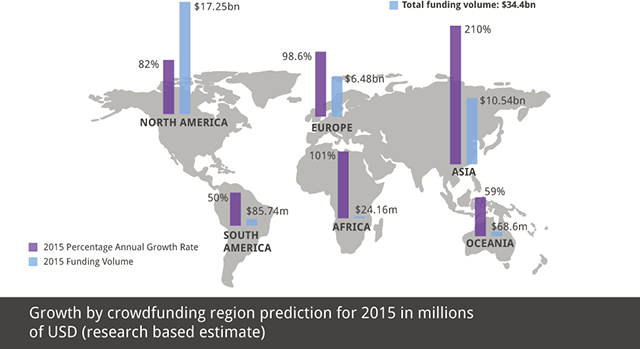
Islamic crowdfunding came into existence in the last couple years to distinguish itself from mainstream crowdfunding. But what is the difference?
Mainstream Crowdfunding
Crowdfunding is a new emerging financing model that grew significantly in the past 5 years. The concept of crowdfunding entails financing an idea, a project, a person or a cause through the collection of small amounts of money from a larger number of providers. At the outset, crowdfunding was dominantly used for non-profit activities. However, with the enactment of the Crowdfund Act (Title III of the JOBS Act) on April 5th, 2012 by the American President Barack Obama, entrepreneurs and small companies (which are usually excluded from banks’ financing) were presented with the opportunity to fund their projects through the public. (See also: Crowdfunding: A New Way to Grow Your Wealth)
Types of Crowdfunding
In such a globalised world, crowdfunding is growing at a tremendous pace. In 2015, the total funding volume reached approximately a dozen billion dollars in North America, Asia and Europe.


The total crowdfunded volumes globally were disproportionately distributed among the different types of crowdfunding: lending, donation, reward, equity and others. In this article, we focus on the main four:
1. Lending or P2P crowdfunding
Platforms offering this service act as an intermediary between borrowers and potential investors. Parties seeking funds get to present why they need a certain amount of funds and what returns they are willing to give back. While there is no real cost of funds compared to banks and other lending institutions, the lending returns are higher and more attractive than the markets. However, there is no guarantee of capital or profits.
The loan contract is directly between borrowers and investors. The P2P platforms are mere intermediaries generating income from flat fees and don’t offer any capital or profits guarantee. Yet, some P2P platforms might assist lenders to recover their debts for some fees or for free. Of course, any P2P platform would like to keep default rates to the minimum. For this, they use more developed credit criteria than banks (social media information for example) to get the most accurate credit scoring possible and avoid default scenarios.
2. Donation-based
Donation-based crowdfunding platforms enable donors to channel their contributions (no matter how small they are) to support different causes. People all over the world can list their non-profit project, cause or emergency cases and solicit generous hearts to help them achieve their social and humanitarian goals. In general, these platforms charge low fees to help solicitors in reaching a global community at low costs.
3. Reward-based
This type tends to be more famous than others when people talk about crowdfunding. Reward-based crowdfunding gained its popularity when it opened new doors of financing to a certain class of people often considered as unbankable. Because of the high risk associated with their projects and an absence of collateral to back their loan application, this class doesn’t stand a chance to get a bank financing. KickStarter.com and Indiegogo.com are among the famous platforms that offer the possibility to anyone to come and pitch – through their platform – his or her idea to the whole world. Anyone interested to back and support the said idea (a music album, an electronic product, films etc) can do it for amounts as tiny as 1$! The authors of ideas can promise to reward his or her supporters, in the case of success, by giving away gifts like an album CD, T-shirts, bags, etc.
4. Equity-based
This type of crowdfunding allows companies to issue shares and collect funds from the public. Many start-ups and small companies prefer to use this alternative mode of financing given its availability and cost-efficiency compared to the traditional financing models. Investors purchasing shares for a small amount of money have to wait until an exit strategy is available to redeem their investments (like an IPO or a buyout scenario). Ideally, investors can see their investments multiply manifold but at a high risk of losing it all.



Do We Need an Islamic Version?
Crowdfunding, in essence, is compliant with the Islamic rules in conducting any commercial or contractual business deal. All types of crowdfunding are more or less in line with Islamic teachings, except for the lending-based crowdfunding. This is due to the presence of interest; or a fixed rate of return.
Interest or usury is a fundamental prohibition in Islam (also in Judaism, Christianity). Therefore any commercial transactions a Muslim would take has to be interest-free. And that’s where the need for an interest-free version of P2P crowdfunding emerges.
How Does P2P Islamic Crowdfunding Work?
Islamic finance offers a variety of 16 types of interest-free business contracts. One of these contracts stands out as the most suitable for P2P crowdfunding, and that is a Profit-Sharing contract (aka Mudharabah contract). The profit-sharing agreement is a contract that combines features of both debt and equity. It is similar to debt because it doesn’t entitle the investor to any ownership or shareholding rights, and similar to equity because the investors share the outcome of the financed project, be it a profit or a loss. This type of agreement is interest-free and therefore compliant with Islamic principles of doing business.
P2P Islamic crowdfunding has the same logic of conventional P2P. However, the type of contract used in Islamic crowdfunding sets it apart from conventional P2P crowdfunding. While the later uses interest-based contract, P2P Islamic crowdfunding uses a profit-sharing agreement that allows investors to share a pre-agreed percentage of profit from the financed projects. The advantage of using this contract is that investors can earn up to 15% per year on their capital. On the other hand, barring any negligence, misconduct, fraud, or breach from the project owner, investors risk losing their investment. Otherwise, investors’ initial capital is guaranteed by the project owner.
Islamic crowdfunding, in a nutshell, is simply a combination of:
- the technology of crowdfunding,
- the principles of Fiqh Muamalat, which are the principles of business interactions in Islam,
- and the modern contracts of the Islamic finance industry.
(See more: Islamic Finance Contract: Mudharabah)
In Conclusion
P2P Islamic crowdfunding is great for those seeking an alternative to the conventional P2P crowdfunding. It can offer a potentially higher degree of returns as there is no fixed-return interest involved, and more importantly, risks are shared across the board in the pursuit of productive purposes. Since Islamic crowdfunding is based on the tenets of Islam, a natural layer of rules prohibiting various destructive intentions or risks are already embedded within Islamic crowdfunding. This is on top of the existing regulations mandated by the law. Not only is the protection of investors of paramount importance, social objectives also takes precedence. Islamic crowdfunding platforms such as EthisCrowd is a testament to that, with the aim of providing affordable housing for low-income families. Although in its infancy stages, Islamic crowdfunding has the potential to become a holistic investment avenue; the pursuit of social objectives while earning above-market returns.
Islamic Crowdfunding has the potential to help us change our world for the better
A more detailed comparison between crowdfunding and Islamic crowdfunding can be seen from our video below:
For an overview of the potential of Islamic finance, check out Can Islamic Finance Serve 2 billion Muslims?
Subscribe to our blog to receive the latest articles. Be part of our strong community now!
EthisCrowd.com is the world’s first Real Estate Islamic Crowdfunding Platform. Our international community of 20,000 private investors crowdfunds investments in entrepreneurial, business, trade and Real Estate activities in Emerging Asia.





Top Posts
Islamic P2P Crowdfunding Explained
Halal Money Matters: How Muslims Can Balance Deen and Dunya with Smart Islamic Finance
Halal Investments for Singapore Muslims? It’s time for a shake-up in the Islamic Investments scene.
Smart investment for making Halal money
3 Reasons Why Property Crowdfunding is the Smart Investment for You